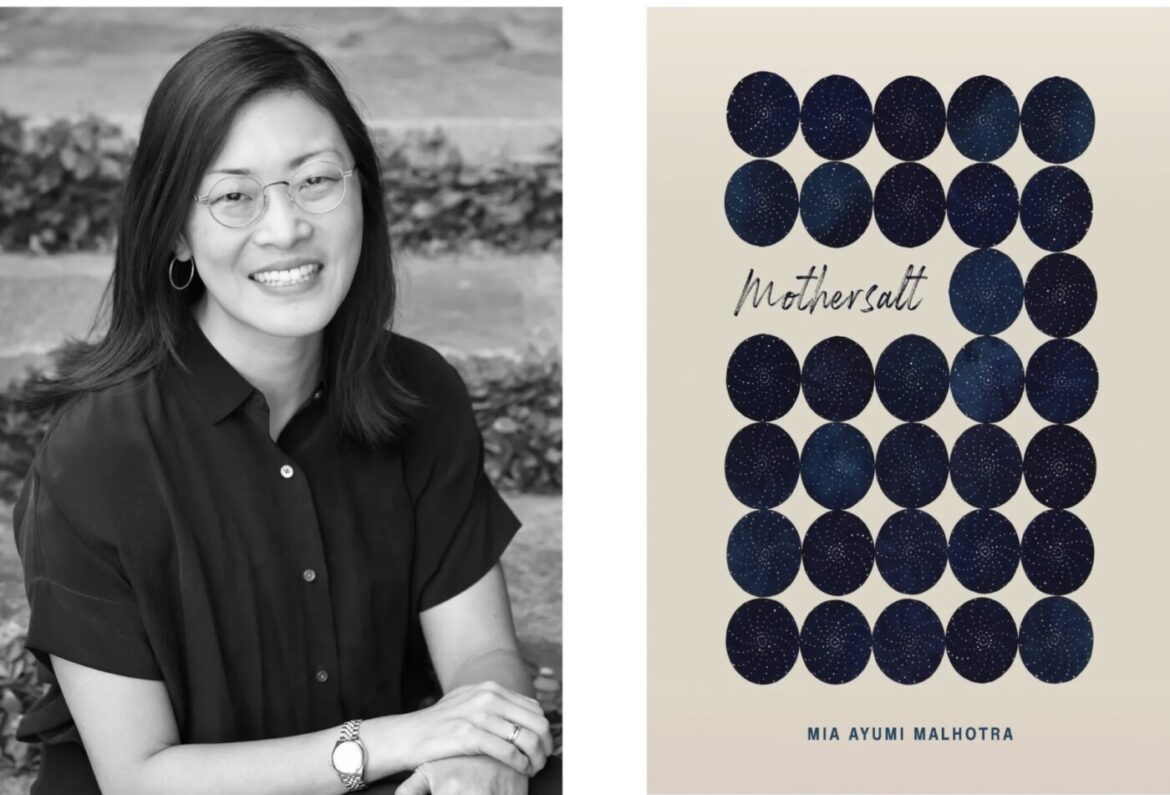Burlingame poet Mia Ayumi Malhotra decided that if she was going to write a book on motherhood, it should go beyond skimming the surface.
“I felt that I needed to make poems that were more rigorous than just a flat description of what it feels like to be a mother,” says Malhotra.
The result of her deep dive is “Mothersalt” (Alice James Books, 81 pages, $24.95, May 13, 2025), wherein she offers a personal account of the joys, challenges and changes she experienced during her two pregnancies and child births—and as a mom.
“The book is so much about trying to piece together a story about myself as one who is giving care but also really in need of it at the same time,” she says.
On May 14, Malhotra celebrates “Mothersalt” at Green Apple Books on the Park in San Francisco’s Sunset. She’ll be joined by fellow poets and friends Shelley Wong, Jennifer S. Cheng and Cathy Linh Che at the book launch.
“I asked each of them if they wanted to say a few words about the role of care and community in their writing lives, and then to read a poem or two so that we could sort of create a nest together for this new book,” she says.
Malhotra, a fourth-generation Japanese American, connected with Wong, Cheng and Che, whom she calls her “poetry siblings,” through Kundiman, a national nonprofit organization nurturing writers and readers of Asian American literature.
“I feel like I’ve really been gifted so much care and so much mothering from each one of them and from the larger community that we’ve been a part of. So it felt like the right thing to ask the three of them to be a part of this event,” says Malhotra, who also wrote the poetry collection Isako Isako (2018), a California Book Award finalist and winner of the Alice James Award, and the chapbook Notes from the Birth Year (2022), the 2021-22 winner of the Bateau Press BOOM Chapbook Contest.
“I’m thrilled to support Mia’s gorgeous poetry book, along with a cadre of some of the most incredible Asian American women poets alive,” says Che.
“Mia is a beautiful soul. I look forward to celebrating her second poetry book as it has been written with profound care, wonder, and devotion,” says Wong.
Malhotra, who received a degree in creative writing from Stanford University, is a founding member of The Ruby SF, a community for women, transfeminine and nonbinary creatives. She also serves on the advisory board of Left Margin LIT, a creative writing center and workspace in Berkeley, where she teaches poetry.
In “Mothersalt,” Malhotra draws from her personal experiences and from others’ considerations of and reflections on what it means to be a mother, including physical and mental effects of pregnancy and childbirth.
Her poem “On Mothering” features a quote from a Miranda Field’s essay about Fanny Howe’s poetry (“Miranda Field on Fanny Howe,” from the anthology “Women Poets on Mentorship: Efforts and Affections”):
“After I left the birth bed, I began to want a poetry in which motherhood was not so much its subject matter but its growing medium—the infrastructural condition of the poet’s feeling and speaking mind.”
Malhotra says, “I was so drawn to that language, and I wove it directly into my poem because I think it really captured what I was after in trying to put these poems together. Field’s description of this new kind of poetry and this new way of being that she was trying to move into, I identified with that a lot.”
Cheng, in an email, says she wishes “Mothersalt” existed before her own experience giving birth: “It brings together the complexities and contradictions of this very primal, very mysterious process of new motherhood—which is strangely excluded from public discourse in this country. Malhotra not only names but transforms the hidden griefs and wounds into a kind of wild and deeply empowering beauty.”
For Malhotra, writing “Mothersalt” helped her affirm her cultural inheritance; she discovered ancient Japanese writers’ use of a prose poetry style, such as in Sei Shōnagon’s “The Pillow Book,” was like her own.
“I felt like I could write with a lot of assurance in this prose-like way because I could claim the lineage, and I felt really strongly a part of that lineage knowing that I was raising daughters and adding to that mother line.”
Her daughters, to whom she dedicated the book, likely will attend the “Mothersalt” launch.
“They’re both so much bigger than they were when I was writing these poems,” says Malhotra. “So it’s interesting, it’s almost like this is a time capsule of an earlier version of our family life, which just really feels so far away now from the diapers and the breastfeeding and the infant patterns of sleep.”
“It’s amazing the things that get passed down. My kids are fifth generation, but I see in some of their aesthetics and their taste in food, there are these ways that culture really endures through diaspora and lots and lots of generations,” she adds.
Mia Ayumi Malhotra launches “Mothersalt” at 7 p.m. May 14 at Green Apple Books on the Park, 1231 Ninth Ave., San Francisco. To RSVP, visit greenapplebooks.com.
The post Poet Mia Ayumi Malhotra interweaves personal narrative, cultural ties in ‘Mothersalt’ appeared first on Local News Matters.
